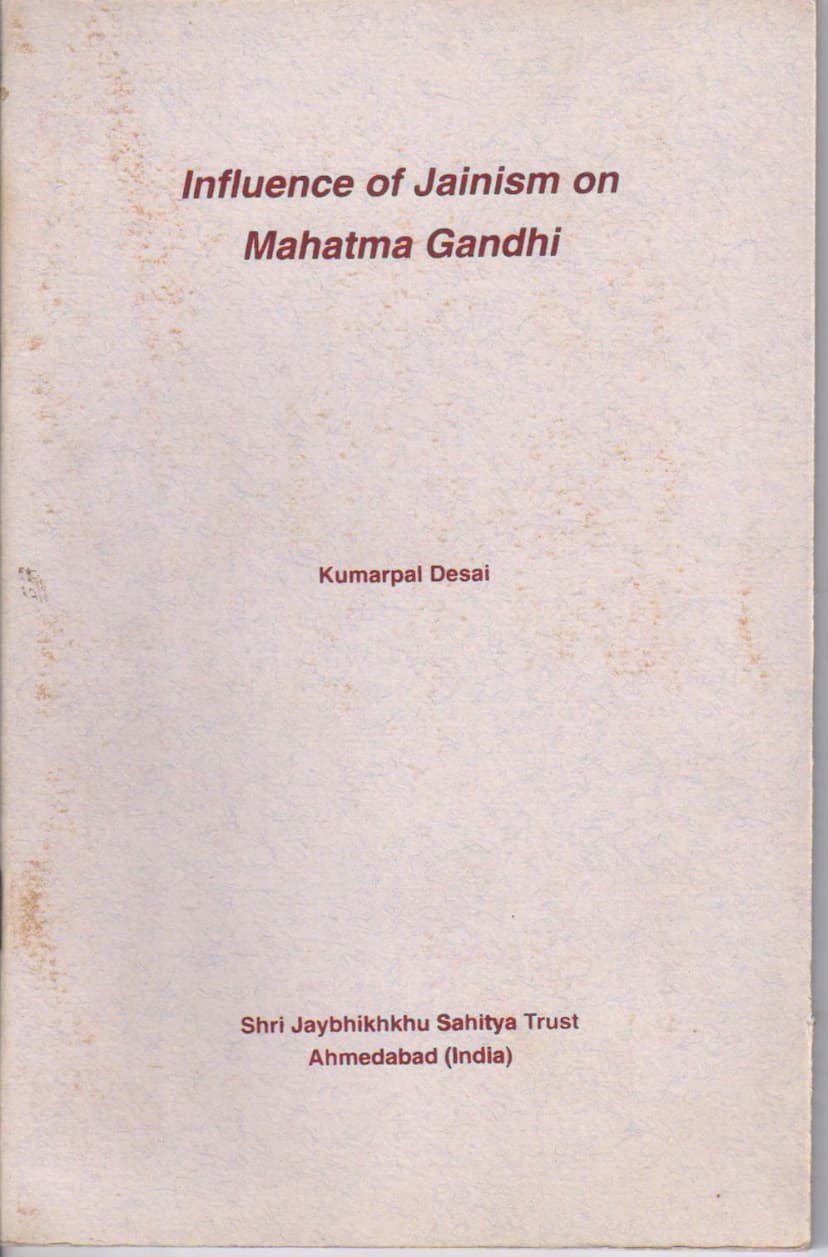Influence Of Jainism On Mahatma Gandhi
Added to library: September 1, 2025

Summary
This document, "Influence of Jainism on Mahatma Gandhi" by Kumarpal Desai, published by Shri Jaybhikhkhu Sahitya Trust, explores the profound and often understated impact of Jainism on the life and philosophy of Mahatma Gandhi.
The book begins by highlighting Gandhi's deep respect for Jainism, particularly through his relationship with Shrimad Rajchandra, whom Gandhi considered his spiritual guru. The author argues that while many biographers have not adequately emphasized this influence, it is undeniable and foundational to Gandhi's core principles.
Key points discussed in the text include:
-
Early Exposure and Vows: The book recounts an early instance in Gandhi's life, at age 19, where he sought the permission of his mother, Putalibai, to study in England. To assuage her fears about the moral temptations abroad, Gandhi took a vow before a Jain sadhu, Bechardasji Swami, to abstain from beef, drinking, and dalliance. This was Gandhi's first significant encounter with a Jain figure and the principles of Jainism.
-
The Pivotal Role of Shrimad Rajchandra: The central theme is Gandhi's deep connection with Shrimad Rajchandra. Their first meeting in 1891 proved to be a turning point. Shrimad Rajchandra, a highly knowledgeable and morally upright individual, impressed Gandhi with his intellect, character, and spiritual depth. Gandhi was particularly struck by Shrimad's stoicism, his scholarly achievements despite limited formal education, and his ability to introspect. Shrimad's influence helped Gandhi overcome his ego and instilled in him humility, which became a hallmark of his character.
-
Spiritual Guidance and Resolution of Doubts: The text emphasizes how Gandhi turned to Shrimad Rajchandra during his spiritual crises. When Gandhi was exploring different religions and grappling with doubts about Hinduism, Christianity, and Islam, Shrimad provided him with profound guidance. Shrimad encouraged Gandhi to delve deeper into Hindu scriptures, recommended specific texts like the Bhagavad Gita, Panchikaran, and Maniratnamala, and helped him regain his faith in Hinduism. This guidance was crucial in preventing Gandhi from converting to Christianity.
-
Adoption of Jain Principles: The book details how Gandhi imbibed core Jain principles, including:
- Ahimsa (Non-violence): Gandhi saw Ahimsa as the central tenet of Jainism, as exemplified by Bhagwan Mahavir. He understood it as a multifaceted concept encompassing compassion for all living beings, not just as a passive resistance but as an active force rooted in love.
- Satya (Truth): Truthfulness was paramount, and Gandhi believed Shrimad Rajchandra embodied this principle, always practicing what he preached.
- Aparigraha (Non-possession): This Jain principle of not hoarding possessions beyond necessity influenced Gandhi's concept of trusteeship.
- Forgiveness: Gandhi learned the virtue of forgiveness from Shrimad, even towards his enemies, as seen in his interactions with Meer Alam and General Smuts.
- Celibacy: Gandhi's practice of abstinence, even in relation to his own wife, was influenced by Shrimad.
- Vegetarianism: The text notes that vegetarianism is central to Jainism and was embraced by Gandhi.
- Fasting: Gandhi utilized fasting as a powerful weapon, a practice deeply rooted in Jain traditions, believing it purified the soul and aided in achieving salvation.
- Anekantavada (Multi-facetedness of Truth): Gandhi was impressed by the Jain philosophy of Anekantavada, which taught him to acknowledge the validity of different perspectives and to avoid rigid judgment of others.
-
Shrimad's Influence on Gandhi's Actions and Philosophy: The book argues that Shrimad Rajchandra's influence was paramount in Gandhi's life, even preceding his engagement with thinkers like Ruskin and Tolstoy. Shrimad's wisdom guided Gandhi through various personal and spiritual challenges, shaping his worldview and his commitment to ethical living.
-
Jainism as a Way of Life: The author concludes that Jainism is not merely a religion but a comprehensive way of life, emphasizing knowledge, character, and conduct. The core values of Jainism are deeply reflected in Gandhi's life, making it evident that Jainism played a significant role in shaping the personality of Mahatma Gandhi, the "Yugpurush."
In essence, "Influence of Jainism on Mahatma Gandhi" asserts that the ethical and spiritual framework of Jainism, particularly as embodied and conveyed by Shrimad Rajchandra, was a foundational element in the development of Mahatma Gandhi's philosophy and his transformative leadership.